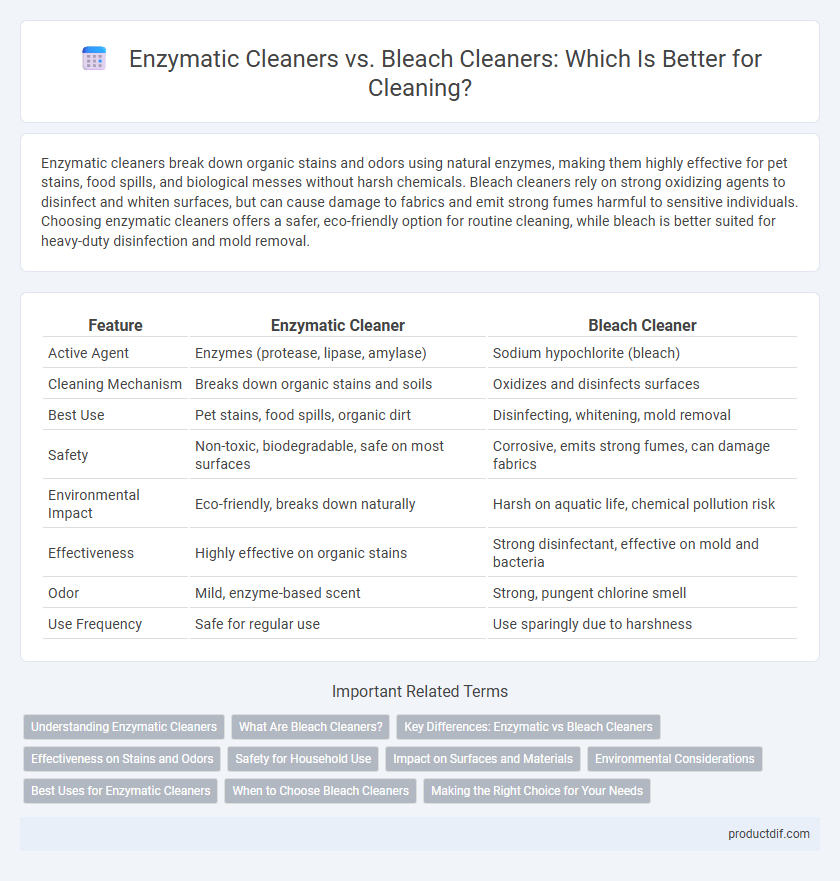Enzymatic cleaners break down organic stains and odors using natural enzymes, making them highly effective for pet stains, food spills, and biological messes without harsh chemicals. Bleach cleaners rely on strong oxidizing agents to disinfect and whiten surfaces, but can cause damage to fabrics and emit strong fumes harmful to sensitive individuals. Choosing enzymatic cleaners offers a safer, eco-friendly option for routine cleaning, while bleach is better suited for heavy-duty disinfection and mold removal.
Table of Comparison
| Feature | Enzymatic Cleaner | Bleach Cleaner |
|---|---|---|
| Active Agent | Enzymes (protease, lipase, amylase) | Sodium hypochlorite (bleach) |
| Cleaning Mechanism | Breaks down organic stains and soils | Oxidizes and disinfects surfaces |
| Best Use | Pet stains, food spills, organic dirt | Disinfecting, whitening, mold removal |
| Safety | Non-toxic, biodegradable, safe on most surfaces | Corrosive, emits strong fumes, can damage fabrics |
| Environmental Impact | Eco-friendly, breaks down naturally | Harsh on aquatic life, chemical pollution risk |
| Effectiveness | Highly effective on organic stains | Strong disinfectant, effective on mold and bacteria |
| Odor | Mild, enzyme-based scent | Strong, pungent chlorine smell |
| Use Frequency | Safe for regular use | Use sparingly due to harshness |
Understanding Enzymatic Cleaners
Enzymatic cleaners utilize biological catalysts like proteases, lipases, and amylases to break down organic stains such as proteins, fats, and carbohydrates, making them highly effective for cleaning food residues and organic matter. Unlike bleach cleaners, which rely on strong chemical oxidation to disinfect and remove stains, enzymatic cleaners offer a gentler, eco-friendly alternative that reduces surface damage and harmful fumes. Their ability to target specific compounds enhances cleaning efficiency in environments requiring safe and thorough sanitation, such as kitchens, hospitals, and pet care areas.
What Are Bleach Cleaners?
Bleach cleaners are chemical solutions containing sodium hypochlorite, known for their powerful disinfecting and whitening properties. They effectively kill bacteria, viruses, and mold, making them ideal for sanitizing surfaces in bathrooms, kitchens, and hospitals. However, bleach cleaners can be harsh on certain materials and require careful handling to avoid skin irritation and respiratory issues.
Key Differences: Enzymatic vs Bleach Cleaners
Enzymatic cleaners break down organic matter using natural enzymes, making them highly effective for removing stains like food, blood, and grease without harsh chemicals. Bleach cleaners rely on sodium hypochlorite to disinfect and whiten surfaces but can cause damage to fabrics and surfaces with repeated use. Enzymatic cleaners are biodegradable and safer for sensitive environments, while bleach cleaners provide strong antimicrobial action but require careful handling.
Effectiveness on Stains and Odors
Enzymatic cleaners break down organic stains and odors by targeting proteins, fats, and carbohydrates, making them highly effective on sources like pet urine, food residues, and blood. Bleach cleaners rely on strong oxidation to whiten surfaces and kill bacteria but can be less effective on odor molecules and may damage fabrics or surfaces. For persistent stains and deep odor removal, enzymatic cleaners provide a more thorough and safer solution compared to bleach-based alternatives.
Safety for Household Use
Enzymatic cleaners break down organic stains using natural enzymes, making them safer for household use by reducing toxic chemical exposure and minimizing skin irritation risks compared to bleach cleaners. Bleach cleaners contain strong chemicals like sodium hypochlorite, which can cause respiratory issues, skin burns, and produce harmful fumes, posing greater hazards, especially in homes with children and pets. For safer cleaning, enzymatic cleaners offer effective stain removal without the harsh effects associated with bleach-based products.
Impact on Surfaces and Materials
Enzymatic cleaners break down organic stains without damaging sensitive surfaces, making them ideal for fabrics, wood, and delicate materials due to their gentle action. Bleach cleaners provide strong disinfection and stain removal but can cause discoloration, corrosion, and surface degradation on metals, fabrics, and painted surfaces. Choosing the appropriate cleaner depends on the material's resilience and the required level of sanitation, as bleach offers harsher chemical effects while enzymes work through natural bio-catalysis.
Environmental Considerations
Enzymatic cleaners break down organic stains using natural enzymes, resulting in biodegradable residues that are safer for aquatic ecosystems and reduce chemical pollution. Bleach cleaners contain sodium hypochlorite, which can release harmful chlorine compounds and create toxic byproducts that persist in the environment. Choosing enzymatic cleaners supports sustainable cleaning by minimizing soil and water contamination and lowering ecological toxicity.
Best Uses for Enzymatic Cleaners
Enzymatic cleaners are most effective for breaking down organic stains such as food, blood, and pet waste, making them ideal for kitchens, bathrooms, and pet areas. Unlike bleach cleaners, enzymatic formulas work by targeting proteins and fats at a molecular level, ensuring deep cleaning without harsh chemical residues. Their biodegradability and safety on delicate surfaces also make enzymatic cleaners the preferred choice for eco-friendly and sensitive surface cleaning.
When to Choose Bleach Cleaners
Bleach cleaners are ideal for disinfecting surfaces contaminated with virus, mold, or bacteria due to their powerful antimicrobial properties. Use bleach cleaners in environments requiring stringent sanitation such as bathrooms, kitchens, and medical facilities. Avoid bleach on delicate fabrics or surfaces sensitive to corrosion to prevent damage and discoloration.
Making the Right Choice for Your Needs
Enzymatic cleaners break down organic stains and odors using natural enzymes, making them ideal for bio-based messes like pet accidents or food spills. Bleach cleaners offer powerful disinfection and stain removal but can damage surfaces and emit strong fumes, requiring careful use on non-porous areas. Choosing the right product depends on surface type, stain composition, and safety preferences, ensuring effective cleaning without harmful side effects.
Enzymatic Cleaner vs Bleach Cleaner Infographic

 productdif.com
productdif.com